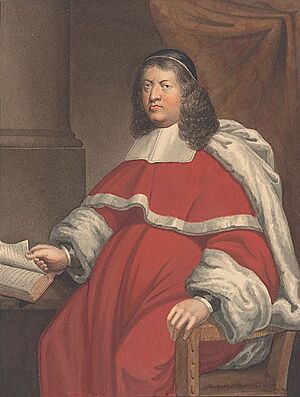Francis Pemberton facts for kids
Sir Francis Pemberton (born July 18, 1624 – died June 10, 1697) was an important English judge. He even served briefly as the top judge, known as the Lord Chief Justice of the King's Bench. He had a very interesting and sometimes difficult career.
Contents
Early Life and Education
Francis Pemberton was born in St Albans on July 18, 1624. His father, Ralph Pemberton, was a former merchant who became the mayor of St. Albans. Francis went to St Albans School and then to Emmanuel College, Cambridge.
When he was young, Francis faced some challenges. He spent time in the Fleet Prison because of money problems. However, he worked hard to change his life. On October 14, 1645, he joined the Inner Temple, a famous place for studying law. He studied very hard and became a lawyer on November 27, 1654.
Family Life
In 1667, Pemberton married Anne Whichcote. She was the daughter of Jeremy Whichcote, who was in charge of the Fleet Prison. They had many children together.
Starting His Law Career
Pemberton quickly became a very successful lawyer. He often worked for the government on important criminal cases. In 1675, he became a Sergeant-at-law, which was a high rank for a lawyer. People at the time thought he was the best lawyer around.
Once, Pemberton was arguing a case in the House of Lords. This case involved some members of the House of Commons. This accidentally started a big argument between the two parts of Parliament. The House of Commons said it was wrong for any lawyer to work on that case. They ordered Pemberton to be arrested. But the House of Lords ordered his release. This back-and-forth fight only stopped when King Charles II stepped in. Pemberton was then set free.
Becoming a Judge
On April 30, 1679, Pemberton became a judge. However, he soon upset the government because of how he handled cases related to the Popish Plot. This was a time when people wrongly believed there was a Catholic plan to kill the King. Because of this, he was removed from his judge position within two years. He went back to being a lawyer.
But he quickly regained favor. On April 11, 1681, he was appointed the Lord Chief Justice of the King's Bench. This was the highest judge position in England.
In the same year, he oversaw the trial of Oliver Plunkett, a leader of the Catholic Church in Ireland. Plunkett was found guilty of treason, but many believed he was innocent. Pemberton also tried to bring Lord Shaftesbury to trial for treason, but he was not successful. Despite these events, many people still thought Pemberton was fair and honest. He was removed from his top judge role in 1682. This was because people worried about his political views in an upcoming case about the City of London. He then accepted a lower position as Chief Justice of the Common Pleas.
The next year, he led a group dealing with the Rye House Plot. This was a plan to kill the King and his brother. Pemberton presided over the trial of Lord Russell. Even though Russell was found guilty, Pemberton was seen as being very fair during the trial. However, he was dismissed from all his judge jobs on September 28, 1683. A famous diarist, John Evelyn, wrote that Pemberton was "the most learned of the judges and an honest man."
Later Years and Legacy
Pemberton went back to being a lawyer again and became very successful. He famously helped defend the Seven Bishops in a major case. In 1689, he faced more trouble with the House of Commons. They said that when he was Lord Chief Justice, he allowed legal action against one of their officers. Pemberton was sent to Newgate Prison for eight months.
After his release, Pemberton's law practice became smaller. He spent a lot of time at his home in The Grove, Highgate. He did help defend Sir John Fenwick in 1696, but they lost the case. Sir Francis Pemberton died on June 10, 1697, and is buried in Highgate Chapel. His first son, Francis Pemberton, also became a lawyer.
In his time, it was not seen as wrong for a judge to go back to being a lawyer. But later, people started to see it differently. They said that a former judge's reputation could unfairly influence juries. In 1929, the Chief Justice of Ireland used Pemberton's example to create a rule. This rule stated that judges should not return to practicing law after they retire.
 | Claudette Colvin |
 | Myrlie Evers-Williams |
 | Alberta Odell Jones |


